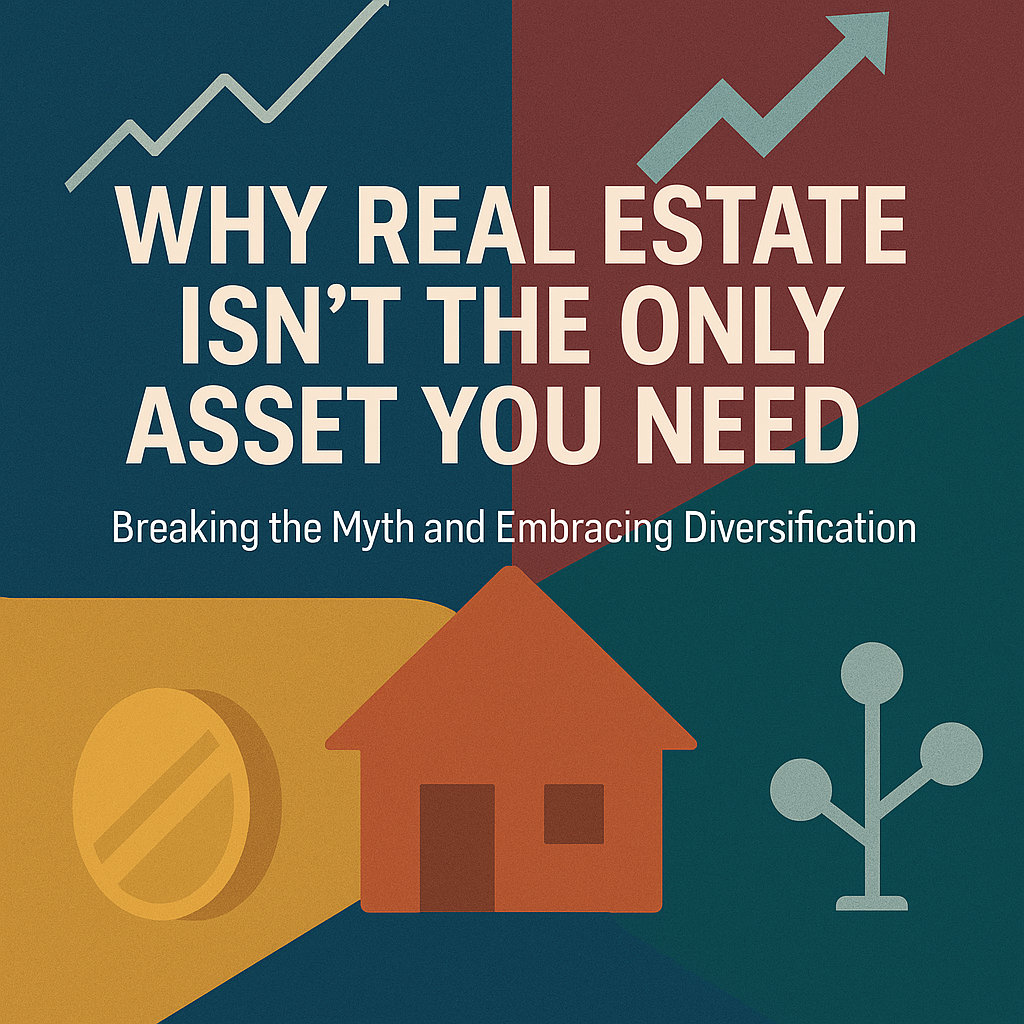Why Real Estate Isn’t the Only Asset You Need: Breaking the Myth and Embracing Diversification
For decades, real estate has held a firm grip on the Indian investor’s psyche. Owning land or a house has been equated with success, stability, and wealth. While real estate can be a valuable component of a portfolio, treating it as the only asset is a risky mindset that limits long-term financial growth.
Nagarjun
5/29/20254 min read


Let’s explore the top reasons why this belief persists—and why diversifying across sectors and asset classes is essential for true financial freedom.
🔍 Why Real Estate is Often Seen as the Ultimate Asset
1. It’s Tangible and Visible
People trust what they can see. A plot of land, a flat in the city, or a second home in the hills offers something physical—unlike equities or mutual funds that exist in a digital space.
“If I can touch it, it must be a safe investment.”
This psychological comfort often overshadows performance-based evaluation.
2. Cultural Conditioning
In India, real estate is considered a status symbol. Many investors recall how their parents or grandparents built wealth through land or homes. This creates a deep-rooted emotional bias that’s passed through generations.
"My grandfather bought a plot for ₹50,000 that’s now worth ₹5 crores!"
But these stories rarely include the cost of holding, liquidity issues, or better alternatives that could have yielded similar or better results.
3. Overconfidence from Past Appreciation
The early 2000s saw massive real estate appreciation in many Indian cities. Many investors still believe the same trend will repeat, forgetting that real estate growth isn’t linear or guaranteed.
"It always goes up."
(But not always quickly, and not everywhere.)
4. Illusion of Low Risk
Land is often seen as inflation-proof and “too big to fail.” While it may hold long-term value, the risks—legal disputes, tenant issues, liquidity challenges—are conveniently ignored.
"Even if markets crash, property will stand strong."
This illusion can lead to an unbalanced, over-leveraged portfolio.
5. The Rental Income Trap
The concept of “passive rental income” is attractive. However, rental yields in India are often just 2–3% annually, and when you factor in taxes, maintenance, and vacancy, the real returns may disappoint.
"The EMI will be paid by rent."
(But what if the property stays vacant for 6 months?)
6. Tax Benefits Drive Buying Decisions
Home loans come with attractive deductions under Sections 80C and 24. While beneficial, these deductions shouldn’t drive major financial decisions.
"I’ll save ₹50,000 in taxes, so I must buy a house."
That ₹50,000 could be earned through smarter investments too—without taking a loan.
7. Herd Mentality
When everyone in your circle is buying real estate, it feels like the default path. This social validation clouds personal risk assessment and leads to copycat investing.
"My colleague has two flats—maybe I’m missing out!"
8. Lack of Awareness About Other Assets
Many people aren’t educated about stocks, mutual funds, ETFs, bonds, REITs, or even digital gold. The sheer jargon and lack of time prevent exploration.
"Share market is too risky. Property is simpler."
But simplicity does not always equate to safety or better returns.
9. Emotional Decision-Making
A house isn’t just an investment—it’s often about dreams, pride, or family. This emotional attachment overrides logical analysis.
"It’s for my child’s future."
There’s nothing wrong with that—unless it's eating up 80% of your investable income with poor liquidity.
10. Ignoring Liquidity and Opportunity Cost
Real estate is not liquid. It may take months to sell a property, and there may be costs like registration, brokerage, legal clearances, and more. Yet many investors ignore the opportunity cost of locking in large chunks of capital.
"It’s safe, even if it’s not earning."
This capital could potentially grow faster and safer through diversified asset classes.
🌐 What’s the Cost of This Mindset?
When real estate forms the bulk of your portfolio, here’s what you lose:
Growth Opportunities: Equity markets historically offer higher inflation-adjusted returns.
Liquidity: Can’t sell 1/5th of a property in an emergency, but you can sell mutual funds or ETFs.
Balance: Market volatility in stocks can be offset by debt, gold, or international funds—but not if you're 90% into property.
Innovation Access: You miss newer instruments like REITs (Real Estate Investment Trusts), international index funds, or government bonds.
📈 How Diversification Can Help
Diversification means spreading your investments across asset classes and sectors to balance risk and reward. A well-diversified portfolio could include:
Equities (Domestic + International)
Debt Instruments (FDs, Bonds, PPF, Debt Funds)
Gold and Silver (ETFs, Sovereign Gold Bonds)
REITs (Real Estate exposure without buying property)
Cash and Liquid Funds for emergencies
Alternative Assets (startups, art, commodities)
This strategic blend ensures that even if one asset underperforms, others balance out your overall growth.
👩💼 Why Work with a Financial Advisor?
An experienced advisor can:
Evaluate your risk appetite
Guide real estate allocations vs. other options
Plan goals like retirement, education, vacations
Rebalance portfolios periodically
Save taxes legally and smartly
🙋♂️ 10 FAQs to Break the Real Estate Bias
1. Isn’t real estate always a good long-term asset?
It can be, but only if timed well, legally sound, and part of a balanced portfolio.
2. Why shouldn’t I invest all my money in property?
Because you miss liquidity, diversification, and higher potential returns from other sectors.
3. How is equity safer than real estate?
Equity is volatile short-term but more liquid and often better performing long-term when diversified.
4. What if I just want rental income?
Consider REITs. They offer real estate-like income without large capital or maintenance headaches.
5. I already have a house. Should I buy another for investment?
Only if your portfolio is already diversified. Don’t let a second house derail liquidity or future goals.
6. Can I start small with other investments?
Yes! SIPs in mutual funds, sovereign gold bonds, or even ₹100 in ETFs let you diversify affordably.
7. How do I track my asset allocation?
A financial advisor or a dashboard tool can help visualize where your wealth is concentrated.
8. Is gold better than real estate?
Not always, but gold (especially digital formats) is more liquid and a good hedge in uncertain times.
9. What if I’ve already invested heavily in property?
Start building exposure in other asset classes gradually. Don’t double down on real estate.
10. Do I need a financial advisor if I already own property and PPF?
Yes. Financial advisors offer tailored diversification strategies, tax planning, and help align your investments with your life goals.
🚀 Important – Utmost!!
Real estate is one asset—not the asset. A well-planned financial future needs balance, flexibility, and awareness. Relying entirely on one asset class—even a trusted one like property—can leave your financial future vulnerable.
"True wealth isn’t just built on land; it’s built on smart, diversified choices."
to schedule a free introductory appointment
+91 81234 26999
FINSPIREYOU@OUTLOOK.COM
© 2026 All Rights Reserved Sukruthi Finspire You
Registration granted by SEBI (INA000020493) , Membership of Bombay Stock Exchange (BSE Enlistment number 2288), and certification from the National Institute of Securities Markets (NISM) in no way guarantee the performance of the Investment Advisor or provide any assurance of returns to Investors. Investments in the securities market are subject to market risks. Read all the related documents carefully.
ARJUN K A
pROPRIETOR sUKRUTHI
